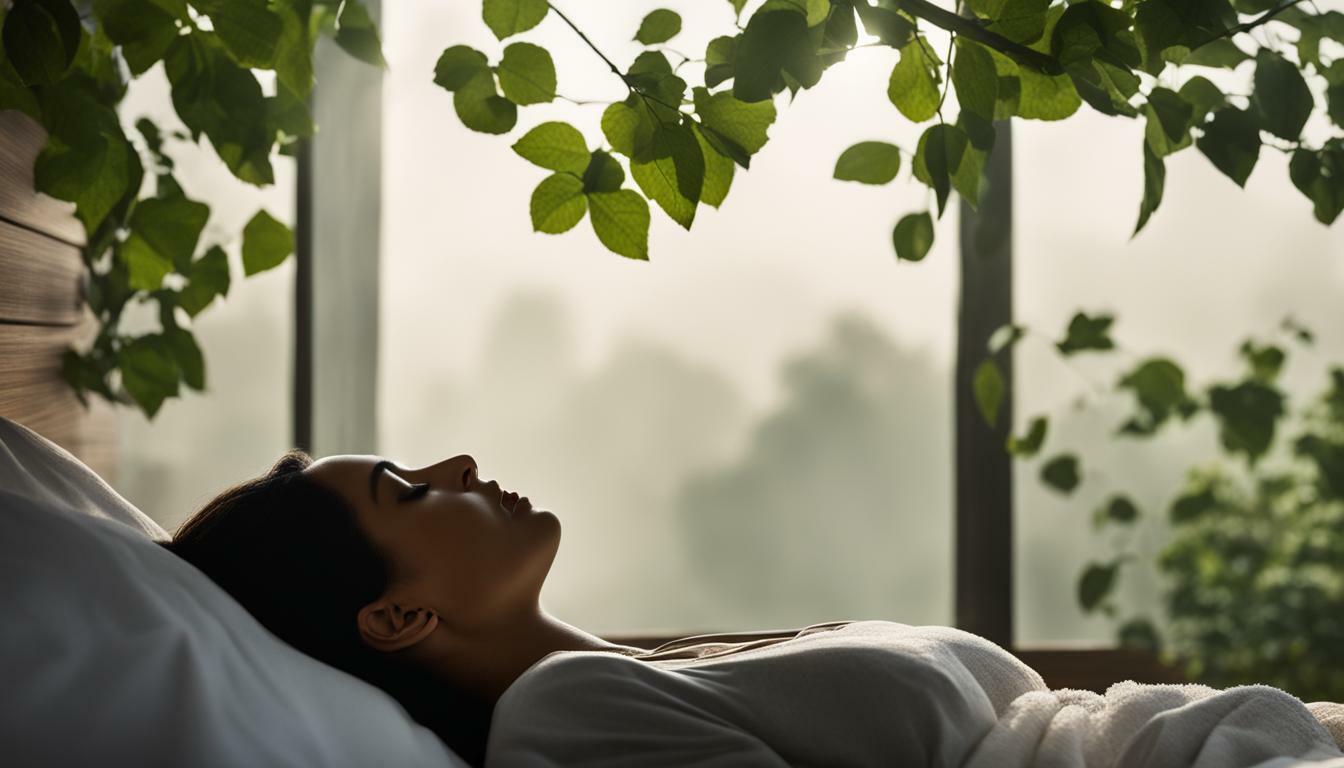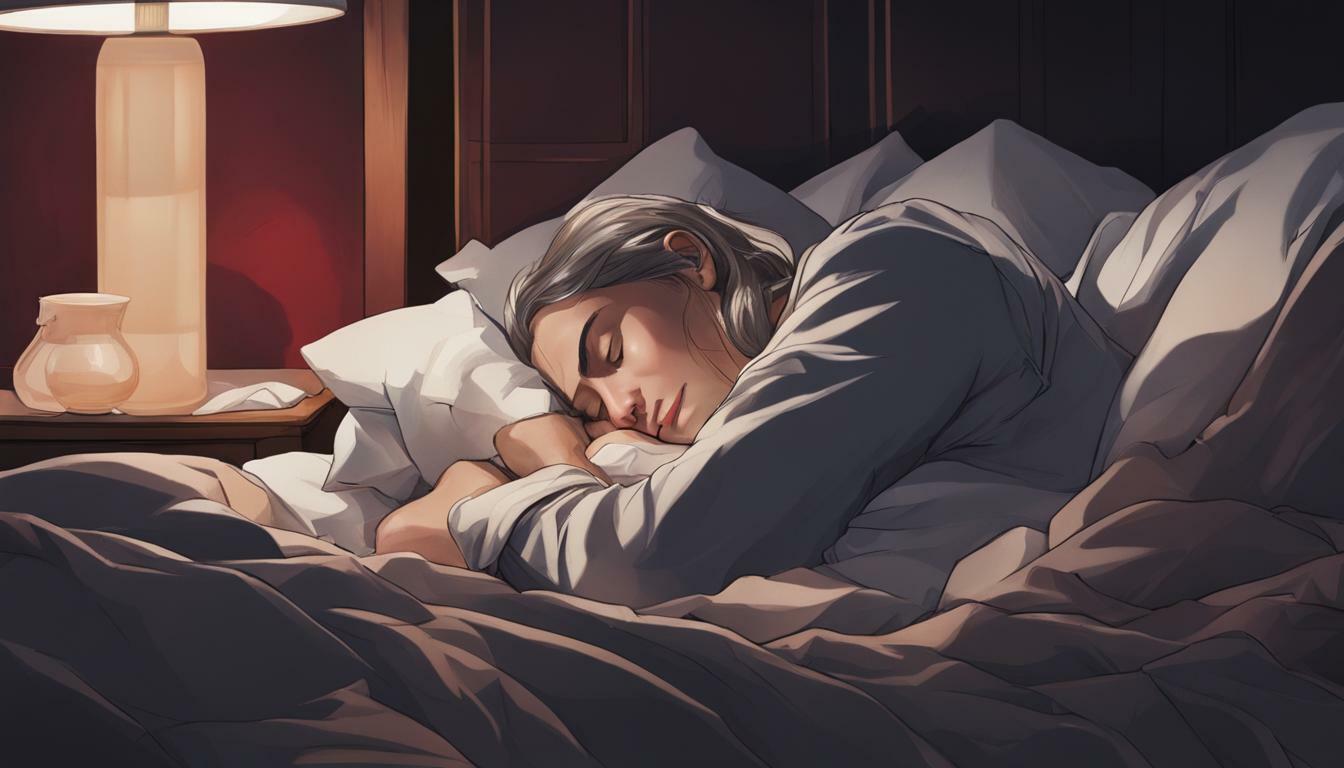Do you struggle with falling asleep at night? Are you tired of counting sheep and still not being able to drift off? You’re not alone. Many people have trouble falling asleep, but don’t worry, there are some weird ways to fall asleep that actually work.
Understanding sleep is crucial to finding the right techniques to help you fall asleep. Your sleep cycle is regulated by your circadian rhythm, which depends on exposure to sunlight.
This means that your body tunes with the natural rhythms of sunlight, waking you up early in the morning and putting you right to sleep at night. However, there are many factors that can disrupt your sleep cycle, such as stress, anxiety, and poor sleep habits.
Table of Contents
Key Takeaways
- There are many unconventional sleep techniques that can help you fall asleep faster and stay asleep longer.
- Understanding your sleep cycle and the role of environment is crucial to finding the right techniques to help you fall asleep.
- From camping to journaling, there are many weird ways to fall asleep that actually work.
Understanding Sleep
Getting enough sleep is essential for your health and well-being. It helps your body and mind to recharge, repair, and refresh. Lack of sleep can lead to a range of health problems, including depression, anxiety, obesity, heart disease, and diabetes.
Sleep is a natural process that occurs in cycles. Each cycle has different stages, including light sleep, deep sleep, and REM (Rapid Eye Movement) sleep. During light sleep, your body relaxes, and your heart rate and breathing slow down.
In deep sleep, your body repairs and regenerates tissues, strengthens the immune system, and consolidates memories. REM sleep is when you dream and process emotions.
The amount of sleep you need varies depending on your age, lifestyle, and health. Most adults need between 7-9 hours of sleep per night. However, some people can function well on less, while others may need more.
There are many factors that can affect your sleep, including stress, caffeine, alcohol, nicotine, medications, and medical conditions.
To improve your sleep, it’s important to establish healthy sleep habits, such as going to bed and waking up at the same time each day, creating a relaxing sleep environment, avoiding stimulants before bedtime, and engaging in regular exercise.
In addition to these habits, there are some weird ways to fall asleep that actually work. These include camping to reset your circadian rhythm, practicing slow, deep breathing to increase relaxation, and journaling to release worries from your mind.
By understanding the importance of sleep and implementing healthy habits, you can improve the quality and quantity of your sleep, leading to better overall health and well-being.
The Role of Environment
When it comes to falling asleep, your environment plays a crucial role. Creating a comfortable and conducive sleep environment can help you fall asleep faster and stay asleep longer.
Here are some factors to consider:
Optimal Room Temperature
Keeping your bedroom at an optimal temperature can help you fall asleep faster and sleep better. The National Sleep Foundation recommends keeping your bedroom temperature between 60 and 67 degrees Fahrenheit (15.6 to 19.4 degrees Celsius) for optimal sleep.
If the temperature in your room is too hot or too cold, it can cause discomfort and make it difficult to fall asleep. You may want to invest in a programmable thermostat or a fan to help regulate the temperature in your room.
Sound Control
Noise can be a major disruptor when it comes to sleep. If you live in a noisy area, or if you have a partner who snores, consider investing in earplugs or a white noise machine. White noise can help mask outside noises and create a more peaceful sleep environment.
On the other hand, if you prefer to fall asleep to music or other sounds, make sure to use headphones or keep the volume low. Loud noises can be stimulating and make it difficult to fall asleep.
Lighting Conditions
Lighting can also have a significant impact on your sleep. Make sure your bedroom is as dark as possible when it’s time to sleep. Use blackout curtains or an eye mask to block out any light that may be coming in from outside.
On the other hand, if you need a little bit of light to fall asleep, consider using a dim nightlight. Just make sure it’s not too bright, as this can interfere with your sleep.
Unconventional Sleep Techniques
If you’re struggling to fall asleep at night, you may want to try some unconventional sleep techniques. Here are a few that have been known to work:
Progressive Muscle Relaxation
Progressive Muscle Relaxation (PMR) is a relaxation technique that involves tensing and then relaxing specific muscle groups in your body. This technique can help you release tension and reduce stress, making it easier for you to fall asleep.
Here’s how to do it:
- Lie down in a comfortable position and close your eyes.
- Focus on your breathing and take a few deep breaths.
- Tense the muscles in your feet and hold for 5 seconds.
- Relax the muscles in your feet and hold for 10 seconds.
- Move up to your calves and repeat the process.
- Continue this process, moving up your body until you reach your head.
Paradoxical Intention
Paradoxical Intention is a technique that involves trying to stay awake instead of trying to fall asleep. This technique can help reduce anxiety and stress associated with trying to fall asleep.
Here’s how to do it:
- Lie down in a comfortable position and close your eyes.
- Instead of trying to fall asleep, try to stay awake.
- Focus on staying awake and keeping your mind active.
- If you start to feel drowsy, try to fight it and keep your mind active.
- Repeat this process until you fall asleep.
Sleep Restriction Therapy
Sleep Restriction Therapy is a technique that involves limiting the amount of time you spend in bed. This technique can help you establish a regular sleep schedule and improve the quality of your sleep.
Here’s how to do it:
- Determine how much sleep you need each night (usually 7-8 hours).
- Calculate what time you need to wake up and subtract the number of hours you need to sleep.
- This is the time you should go to bed each night.
- Stick to this schedule, even on weekends.
- If you’re not able to fall asleep within 20 minutes, get out of bed and do something relaxing until you feel sleepy.
- Gradually increase the amount of time you spend in bed as your sleep improves.
Remember, these techniques may not work for everyone, but they are worth trying if you’re struggling to fall asleep. If you continue to have trouble sleeping, it’s important to talk to your doctor or a sleep specialist.
Dietary Influence on Sleep
When it comes to getting a good night’s sleep, what you eat can have a big impact on the quality of your rest. Here are some dietary tips to help you get the most out of your sleep:
Foods that Promote Sleep
Certain foods can help promote better sleep by increasing the production of sleep-inducing hormones like melatonin and serotonin. Here are some foods that can help you sleep better:
- Cherries: Cherries are a natural source of melatonin, a hormone that regulates sleep.
- Almonds: Almonds are rich in magnesium, a mineral that can help relax your muscles and calm your nerves.
- Warm Milk: Warm milk contains tryptophan, an amino acid that can help promote sleep.
- Bananas: Bananas are a good source of magnesium and potassium, which can help relax your muscles and promote sleep.
Avoiding Caffeine and Alcohol
While certain foods can help promote better sleep, others can have the opposite effect. Here are some foods and drinks to avoid if you want to get a good night’s sleep:
- Caffeine: Caffeine is a stimulant that can keep you awake and disrupt your sleep. Avoid drinking coffee, tea, or soda in the evening.
- Alcohol: While alcohol may help you fall asleep faster, it can disrupt your sleep later in the night. Avoid drinking alcohol before bed if you want to get a good night’s sleep.
By following these dietary tips, you can help promote better sleep and wake up feeling rested and refreshed.
Exercise and Sleep
Regular exercise can help you fall asleep faster and enjoy deeper sleep. Physical activity increases the production of serotonin, a neurotransmitter that regulates mood and sleep.
However, exercising too close to bedtime can have the opposite effect, making it harder to fall asleep.
Experts recommend finishing your workout at least three hours before bedtime. This gives your body enough time to cool down and relax.
If you prefer to exercise in the evening, try low-impact activities like yoga or stretching. These can help calm your mind and prepare your body for sleep.
In addition to improving sleep quality, exercise can also reduce symptoms of sleep disorders like insomnia and sleep apnea. However, it’s important to talk to your doctor before starting a new exercise program, especially if you have any underlying health conditions.
To get the most out of your exercise routine, aim for at least 150 minutes of moderate aerobic activity or 75 minutes of vigorous aerobic activity per week. You can also incorporate strength training and flexibility exercises for a well-rounded fitness plan.
Remember, exercise is just one piece of the puzzle when it comes to getting better sleep. Other factors like diet, stress management, and sleep environment also play a role.
By making small changes to your lifestyle, you can improve your sleep and wake up feeling refreshed and energized.
Frequently Asked Questions
How can you fall asleep in 10 seconds?
There is a trick known as the 4-7-8 breathing technique that can help you fall asleep in 10 seconds. First, exhale completely through your mouth.
Then, inhale through your nose for 4 seconds. Hold your breath for 7 seconds, and exhale through your mouth for 8 seconds. Repeat this cycle for a few minutes until you fall asleep.
What is the military method for falling asleep?
The military method involves relaxing your face muscles, shoulders, and arms. Then, you should exhale and relax your chest, followed by relaxing your legs and feet.
After that, you should clear your mind and focus on relaxing your body for 10 seconds. This method is said to work in just two minutes.
What are some unconventional ways to fall asleep?
Some unconventional ways to fall asleep include drinking tart cherry juice, taking a hot bath or shower before bed, using aromatherapy, listening to white noise or calming music, and sleeping in a hammock.
These methods can help relax your body and mind and promote better sleep.
What is the best trick to fall asleep quickly?
The best trick to fall asleep quickly is to establish a consistent sleep routine. Try to go to bed and wake up at the same time every day, even on weekends.
Avoid caffeine, alcohol, and nicotine before bed and create a relaxing sleep environment by keeping your bedroom dark, cool, and quiet.
Is there a way to force yourself to fall asleep?
Forcing yourself to fall asleep can be counterproductive and lead to more stress and anxiety. Instead, try relaxation techniques such as deep breathing, progressive muscle relaxation, or visualization exercises.
If you still can’t fall asleep, get out of bed and do something relaxing until you feel tired.
When nothing else is working, how can you fall asleep?
When nothing else is working, try getting up and doing a relaxing activity such as reading a book or listening to calming music. Avoid screens and bright lights, as they can stimulate your brain and make it harder to fall asleep. Once you feel tired, go back to bed and try again.
Final Thoughts
In conclusion, falling asleep can be a challenge for many people, but there are plenty of unconventional ways to help you get those Zzzs. Some of the methods we’ve discussed may seem strange, but they have been proven to work for many people.
Remember, it’s important to create a sleep-conducive environment by keeping your bedroom dark, quiet, and cool. Avoiding caffeine and alcohol before bedtime can also help you fall asleep faster.
If you’re still struggling to fall asleep, try some of the techniques we’ve discussed, such as the 4-7-8 breathing method, progressive muscle relaxation, or visualization. You may also want to consider seeking professional help if your insomnia persists.
Overall, the key to falling asleep is to find what works best for you and to stick with it. With a little experimentation and patience, you’ll be able to get the restful sleep you need to feel your best.



